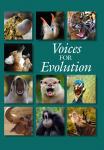
The chorus of support for the teaching of evolution continues, with statements from seven science departments at colleges and universities throughout the country.
The Department of Biology at Baylor University's statement reads, "Evolution, a foundational principle of modern biology, is supported by overwhelming scientific evidence and is accepted by the vast majority of scientists. Because it is fundamental to the understanding of modern biology, the faculty in the Biology Department at Baylor University, Waco, TX, teach evolution throughout the biology curriculum. ... We are a science department, so we do not teach alternative hypotheses or philosophically deduced theories that cannot be tested rigorously."
In its statement, the Department of Chemistry and Biochemistry at Baylor University agrees, "Evolution, a foundational principle of modern biological sciences, is supported by overwhelming scientific evidence," and adds, "It is fundamental to the understanding of modern biochemistry, and our faculty incorporate the principle of evolution throughout the biochemistry curriculum. We are a science department, and we do not teach alternative hypotheses or philosophically deduced theories that cannot be tested rigorously."
The Biology Department at Central Connecticut State University's statement reads, "Evolution, a foundational principle of modern biological sciences, is supported by overwhelming scientific evidence. It is fundamental to the understanding of modern biology, and our faculty incorporate the principle of evolution throughout the curriculum. As we are a science department, we do not teach alternative hypotheses or philosophically deduced theories that cannot be tested rigorously. ... Without an understanding of evolutionary biology, our perception of the natural world would be greatly diminished."
In its statement, the Department of Biology at the College of New Jersey describes the faculty there as "unequivocal in its support of the contemporary theory of biological evolution. Evolutionary theory has been supported by data collection and analysis conducted over the past 150 years. No credible evidence has been presented to date in support of any alternative scientific theory to explain the origin of organic diversity. The faculty of the Department of Biology fully endorses the resolution ... by the American Association for the Advancement of Science on this issue."
Lehigh University's Department of Biological Sciences's statement describes the faculty there as "unequivocal in their support of evolutionary theory, which ... has been supported by findings accumulated over 140 years," adding, "The sole dissenter from this position, Prof. Michael Behe, is a well-known proponent of 'intelligent design.' While we respect Prof. Behe's right to express his views, they are his alone and are in no way endorsed by the department. It is our collective position that intelligent design has no basis in science, has not been tested experimentally, and should not be regarded as scientific."
In its statement, the Biology Faculty of Oklahoma City Community College describes evolutionary theory as "strengthened by over a century of observation and experimentation" and as "a crucial component of life science education," and adds, "While the College respects the right of individuals to hold personal or opposing views, the biology program will teach Evolutionary Theory as the central concept of modern biological science. It is our intent that the explanatory power of this subject will contribute greatly to our students' understanding of biology."
And the Saint Louis University Department of Biology's statement reads, "Since first proposed, the theory of evolution has transformed the study of life by providing a framework for understanding natural processes. ... Empirical studies over the past 150 years have provided tightly interwoven evidence for evolution and effectively serve as a guiding light for current and future biological inquiry. To confront students with untestable alternatives would not only misrepresent the significance of evolutionary theory and the legitimacy of the scientific method, but would also jeopardize future achievements."
All seven of these statements are now reproduced, by permission, on NCSE's website, and will also be contained in the fourth edition of NCSE's Voices for Evolution.
